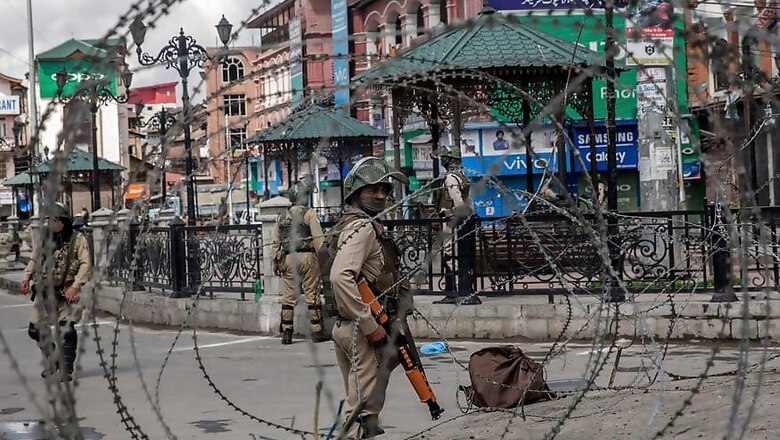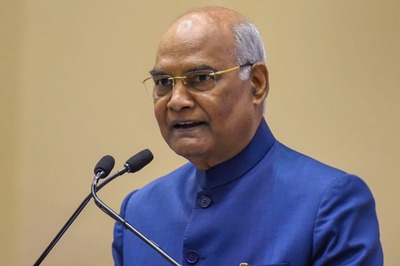
views
In the early spring of 2011, Mohammad Iqbal, from Hawoora village in Kulgam district and a government employee, participated in the Panchayat polls in Jammu and Kashmir for the first time. A staunch Jama’at-i-Islami follower, Iqbal says he voted for his friend in the elections.
“I have always boycotted from voting. We show our resistance by staying away from polls. The only reason that I voted in the Panchayat polls was that my friend, also a neighbor, was contesting. His defeat at the hands of the person from another part of the village wouldn’t have been bearable,” says Iqbal, now in his early fifties
In 2011, Panchayat polls were held in Jammu and Kashmir after nearly four decades. Despite the violent protests and unrest in 2010 in which more than 130 protesters were killed, a record turnout of over 80 percent people turned up for the voting which saw 4,130 sarpanchs and 29,719 panchs elected. A sarpanch is the head of a cluster of wards or a village while a panch is an elected member of a village ward.
Next year, in February, Sarpanch of Hawoora village, Ghulam Mohammad Dar, was gunned down by suspected militants outside his residence. He was one of the first elected Panchayat members in Kashmir valley to be killed after 2011 elections.
In the coming months and years, more such killings took place and
attacks began surging. Sixteen sarpanchs and panchs were killed by gunmen while over two dozen were injured in the attacks. Police said militants are behind these killings, but the latter never claimed responsibility for these attacks.
In the summer of 2016, Kashmir witnessed unprecedented violence. On July 8, Burhan Wani, Hizul Mujahideen Commander who became popular with his social media campaign, was killed in joint operation by forces in Bamdoora village of south Kashmir’s Anantnag district.
The scale of unrest was so high that over a hundred people were killed and thousands injured.
Since then Kashmir is on the edge.
In May 2017, by-election to the Anantnag Lok Sabha seat was cancelled. The Election Commission said the situation was not “feasible” to hold elections.
Earlier in April 2017, during the bypoll for Srinagar constituency, eight people were killed while protesting. The voter turnout was six percent.
The erstwhile PDP-BP coalition government, headed by Mehbooba Mufti, in December last year announced that the Panchayat polls would be held from February 15, 2018, on non-party basis. However, the polls were again postponed due to the situation on the ground.
Recently, Panchayat and Municipal polls were announced in the state. The Municipal polls, to be held in four phases, are scheduled from October 1 to October 5; the Panchayat polls, to be held in eight phases, are scheduled from November 8 to December 4.
The events, however, have taken a dramatic turn. Two major political parties of Kashmir: the National Conference (NC) and the Peoples Democratic Party (PDP) have boycotted the elections. The NC announced last week that it would boycott the upcoming polls till the Centre clarifies its position on Article 35A, which was incorporated in the Constitution by a 1954 Presidential Order and accords special rights and privileges to the citizens of Jammu and Kashmir and bars people from outside from acquiring any immovable property in the state.
The PDP boycotted the polls on Monday, saying polls at this time will be “against the will of the people” and instead focus should be on “confidence-building measures.”
The Supreme Court has adjourned till January 2019 the hearing on petitions challenging the constitutional validity of Article 35A.
The court said it would wait for the Panchayat polls to get over in December as both the state government and the Centre had submitted to it that hearing the petitions now would create a law and order problem.
The situation on ground
Mohammad Iqbal says this time no one will dare to contest elections in his area. “The last election was like a social event. There was overwhelming participation because everyone knew everyone — voters and those contesting,” he says. “There was competition at the village level.”
After the killing of the sarpanchs and panchs, the elected members began resigning. After the killing of Burhan Wani, the situation became more volatile. Hundreds of Panchayat members resigned and vowed to never participate again.
“When the killings took place in 2016, people began looking at us as the agents of the government,” said Nazir Ahmad, a former sarpanch from Shopian district.
“It was like we were also responsible for the situation.”
Nazir says he feels guilty that he participated in the Panchayat elections.
“There is a person in every area of Kashmir who was killed or injured in 2016 during protests. I can’t overlook them and contest elections,” he says. “If I have to live in my village I will have to respect the sentiments of people."
Aijaz Ahmad Mir was a Sarpanch from Zainapora Shopian. He later contested Assembly elections and is now a PDP MLA.
“People in Kashmir are angry with the politicians. They will react to any step taken by the mainstream. Moreover, there is the militant threat. No one will like to get killed,” says Mir.
Recently, the Hizbul Mujahideen commander Reyaz Naikoo warned of the attack on contesting candidates and voters with sulphuric and hydrochloric acid. “Bring shrouds with you while filing nomination forms,” he warned in an audio message.
Besides the threat, Mir finds other reasons also responsible.
“Government didn’t pay attention towards strengthening of Panchayat system — the basic democracy. They were not empowered,” says Mir.
He says that when sarpanchs and panchs were elected in J&K, MLAs got perturbed.
“MLAs are opposed to the empowerment of Panchayats because they think it will affect their power and influence,” Mir told News18. “A sarpanch would get a monthly salary of Rs 2000 and a panch Rs 600.”
“They were never given any power. It felt like the Panchayat elections were an exhibition of democracy,” he says. “Now why will anyone risk his life,” he asks.
Shabir Ahmad Rather is another former panch from Rajpora area of
Shopian. “Even talking about the elections is not safe. I will not contest elections,” he says citing the reason, “no one will like to die.”
“The government wants to portray that situation on the ground is fine but actually it is much worse. Those who will talk about elections and voting at this time are the biggest collaborators,” says Rather.
As per the party insiders in the NC and the PDP, Article 35 was meant as a face-saving measure.
“Actually, people are not ready to contest elections. The workers have clearly told party high command that they are not even able to come out of their houses,” said an NC insider.
Four days before boycotting elections, Farooq Abdullah had urged people to vote in the local polls for a “better future”.
“Our party workers at the ground were furious with this statement. It was pressure from the party cadre at the ground that Farooq Abdullah announced the boycott,” the NC insider told News18.
The situation is same in the entire valley and not only in south Kashmir, which is considered as the militant hotbed.
Fayaz Ahmad Mir, former sarpanch from Kunan-Poshpora in Kupwara district of north Kashmir, says: “People are disappointed. They have reached the conclusion that nothing is happening because of this (Panchayat elections). They think it is futile.”
(Some names have been changed on request)
(The author is a Kashmir-based freelance journalist.)




















Comments
0 comment